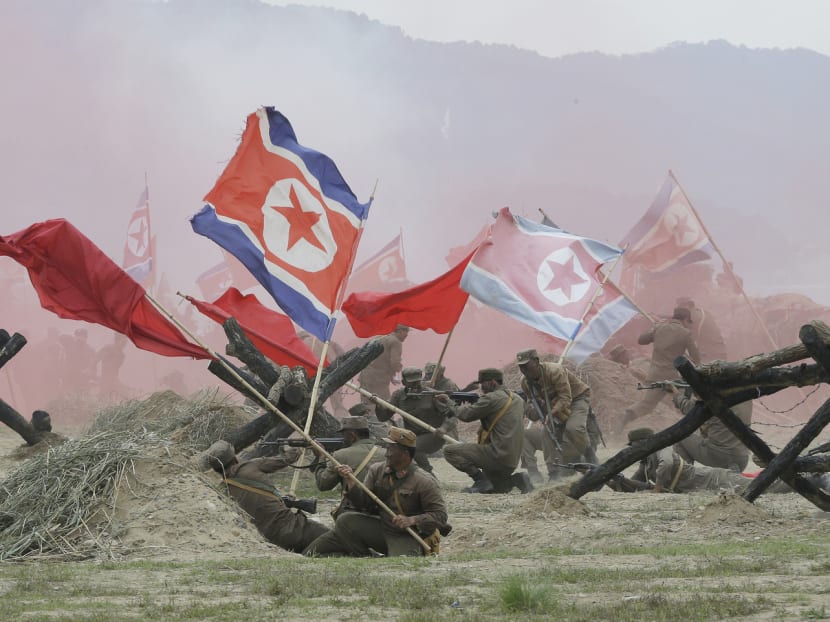S Korea rejects calls to hold talks with Pyongyang
SEOUL — South Korean President Park Geun-hye yesterday rejected calls to hold talks with North Korea to defuse escalating tensions after Pyongyang’s repeated provocations, including its latest test of a new rocket engine.

South Korean soldiers dressed like North Korean soldiers waving North Korean flags during a re-enactment of the Naktong River Battle, as part of commemoration events for the 66th anniversary of the Korean War. Rejecting the possibility of holding peace talks with the North, South Korean President Park Geun-hye said money had been given to the North in the past for the sake of dialogue, but it was used to develop nuclear weapons. Photo: AP
SEOUL — South Korean President Park Geun-hye yesterday rejected calls to hold talks with North Korea to defuse escalating tensions after Pyongyang’s repeated provocations, including its latest test of a new rocket engine.
“It’s not because we and the international community didn’t hold talks with North Korea that the North went ahead with its fourth and fifth nuclear tests,” Ms Park said during a meeting with senior secretaries, according to the presidential office.
Her remarks were in response to calls within South Korea, including from opposition party lawmakers, to seek talks with North Korea in an effort to reduce military tensions in the Korean Peninsula.
The President said money had been given to the North in the past for the sake of dialogue but the money was used to develop nuclear weapons. She added that Pyongyang has advanced its nuclear capabilities with no intentions to denuclearise while talks on denuclearisation were ongoing, her office said in a statement.
“I and the government will do everything possible to break down (North Korean leader) Kim Jong-un’s maniacal obsession for nuclear weapons and missiles, and protect the nation and the people,” Ms Park was quoted as saying.
She said she believed North Korea would not come to the dialogue table to discuss its abandonment of nuclear weapons and, instead, would further intensify its nuclear and missile provocations. Ms Park reiterated the position that South Korea would support the United Nations (UN) Security Council in imposing new and strong sanctions on the North and also seek necessary unilateral measures against the North.
In its latest show of sabre-rattling, North Korea said on Tuesday it successfully tested a new rocket engine ostensibly for launching satellites, but which is seen as another step in the North’s quest for an intercontinental ballistic missile. It has ignored global condemnation of its fifth nuclear test on Sept 9.
The leaders of the United States and China condemned the latest nuclear test and pledged to step up cooperation at the UN and in law enforcement channels. UN diplomats said the two countries have begun discussions on a possible UN resolution in response to the latest nuclear test, but China — the North’s main diplomatic ally and economic benefactor — has not said directly whether it would support tougher steps against North Korea.
Earlier in the week, Washington deployed two nuclear-capable supersonic bombers over South Korea as a show of strength — the second such flight since North Korea’s fifth nuclear test. The US military said at least one of its bombers approached the border with North Korea.
The US Pacific Command added on its website on Wednesday that the flight was the closest a B-1 bomber has ever flown to the border.
The flight will likely anger North Korea, which is extremely sensitive to the deployment of high-tech American weapons systems.
About 28,500 American troops are stationed in South Korea to deter potential aggression from North Korea in a legacy of the 1950-53 Korean War that ended with an armistice, not a peace treaty. AGENCIES






